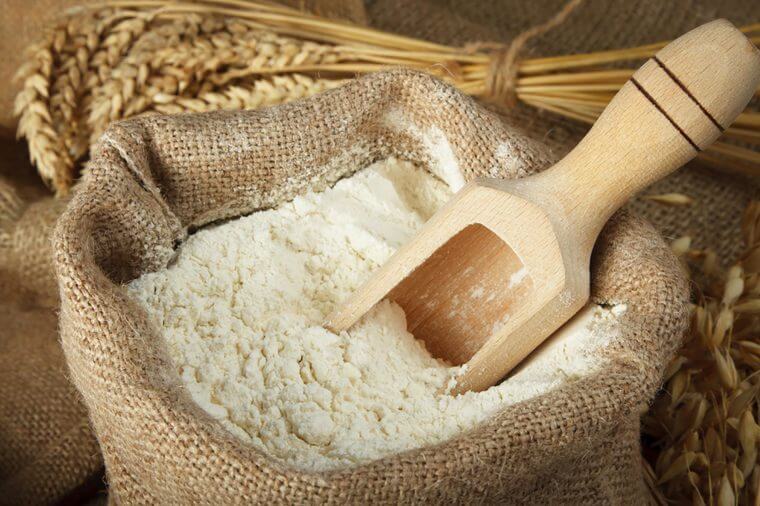You know to avoid raw meat and eggs. But there are plenty of other foods that you definitely want to cook before eating, and some of them might surprise you.
Potatoes

Yes, this tuber-iffic mealtime staple should never be eaten raw! “Eating potatoes raw can cause bloating and undesirable gastrointestinal effects, because potatoes contain starches that are resistant to being digested,” says Dr. Lisa Davis, the chief nutrition officer at Terra’s Kitchen. (Cooking the potatoes successfully breaks down these starches.) Even scarier, if raw potatoes spend a long time in a warm or damp area, they can turn green and develop a toxin called solanine. If a potato appears to have green spots on it, you should avoid eating it altogether, because the solanine could cause food poisoning.
Yucca

One word: Cyanide! This root vegetable, a staple of South American cuisine, is packed with vitamins and minerals. But it’s also hiding a sneaky, potentially lethal ingredient. The leaves and roots of raw yucca contain cyanogenic glycosides, chemicals that release cyanide when eaten. Yucca is still edible, but make sure you wash it thoroughly, rinse it, peel it, and cook it before consumption.
Kidney beans

Here’s another normally healthy food that can be dangerous if eaten the wrong way. Red kidney beans are packed with protein, fiber, and antioxidants, but eating them raw can wreak havoc on your stomach. “Uncooked kidney beans contain the toxin phytohemagglutinin, which can cause unpleasant gastrointestinal discomfort and symptoms similar to food poisoning,” says Dr. Davis. Make sure you boil kidney beans for at least ten minutes before eating them.
Hot dogs

Hot dogs aren’t the most nutritious food as it is, but eating them raw can be downright dangerous. It’s a common misconception that, since they’re pre-cooked, hot dogs can be eaten right out of the package like lunch meat. This isn’t the case at all. According to the FDA, packaged hot dogs can become contaminated with the bacteria Listeria, which can only be killed by reheating the dogs.
Milk

You might hear “raw milk” and wonder what that could possibly mean. You don’t cook milk! But raw milk is real, and it’s dangerous. Milk that comes straight from a cow, without being pasteurized, can contain harmful bacteria like E. coli and Salmonella. According to the FDA, raw milk is 150 times more likely to cause foodborne illnesses than other dairy products. The sale of raw milk at grocery stores is still legal in several states, so be sure that you’re always buying pasteurized milk.
Sprouts

Sprouts—they’re so healthy! What could possibly be wrong with them? Well, alfalfa and radish sprouts can contain pesky harmful bacteria like E. coli, Salmonella, and Listeria. Sprouts are grown in warm, moist conditions where these bacteria thrive. Because of this, you should aim to buy your sprouts as fresh as possible; consider buying them locally or from a farmers’ market. And, of course, wash them and cook them.
Bitter almonds

The almonds that we know and love are also called “sweet almonds,” and there are some excellent health reasons to eat them. Bitter almonds are kind of like their evil cousin. They’re a variety of sweet almonds, but they contain hydrocyanic acid, which is a dangerous combo of hydrogen cyanide and water. According to The Spruce, it would only take about 70 raw bitter almonds to kill a fully grown adult. Yikes! Thankfully, they’re safe to eat if they’ve been cooked, and most U.S. grocery stores don’t sell them. The likeliest places you’ll encounter them are in almond extract and almond-flavored liqueurs.
Flour

You’ve probably heard, countless times, about the dangers of eating raw eggs, and may have even been shooed away from raw brownie batter or cookie dough for that very reason. But egg is only part of the problem; eating pre-cooked flour might be just as problematic. In recent years, the FDA and the Centers for Disease Control and Prevention have identified raw flour as a potential health hazard. During its journey from wheat stalk to supermarket shelf, flour may have come into contact with pathogens such as E. coli, which can only be banished by cooking whatever the flour is in. Convinced that raw cookie dough is worth the risk?
Eggplant

Approach raw eggplant with caution. Raw eggplant contains solanine, the same toxin that makes raw potatoes problematic. “Young eggplants” in particular, or eggplants that were harvested early in their plant lives, contain the most of this toxin. You would have to eat a whole lot of raw eggplant to experience the unpleasant gastrointestinal effects of solanine poisoning, but you might want to go ahead and cook your eggplant anyway. Plus, some people may have allergic reactions to even small amounts of raw eggplant.












